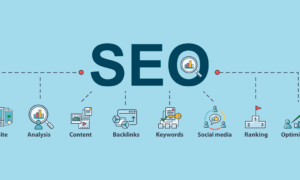Search Engine Optimization, or SEO, is a crucial aspect of the digital landscape that directly impacts the visibility and ranking of websites on search engine results pages (SERPs). In this comprehensive guide, we will delve into the world of SEO, exploring its fundamental principles, strategies, and importance in today’s online environment.
Introduction to SEO
In today’s digital age, where the internet serves as a vast repository of information, SEO plays a pivotal role in connecting users with relevant content. SEO involves a series of strategies and techniques aimed at optimizing a website’s online presence, thereby increasing its visibility and organic (non-paid) traffic. Let’s explore how search engines work and the components that constitute effective SEO.
How Search Engines Work
Search engines are sophisticated algorithms designed to provide users with the most relevant and valuable results based on their search queries. They crawl, index, and rank websites based on various factors such as relevance, authority, and user experience. Understanding these mechanisms is essential to devising effective SEO strategies.
The Key Components of SEO
Successful SEO is a combination of multiple factors that work together to improve a website’s performance on search engines. On-page optimization involves optimizing individual web pages for specific keywords and ensuring high-quality content. Off-page optimization focuses on building authoritative backlinks and social signals that establish a site’s credibility. Technical SEO involves optimizing the website’s infrastructure for better crawling and indexing by search engines.
Understanding Keywords
Keywords are the foundation of SEO. Thorough keyword research enables you to identify the terms users use to search for information related to your business or industry. Long-tail keywords, which are more specific phrases, often yield valuable traffic by targeting niche audiences.
Crafting High-Quality Content
Content is king in the world of SEO. Search engines prioritize websites that offer valuable, relevant, and engaging content to users. Crafting high-quality articles, blog posts, videos, and infographics not only attracts users but also encourages backlinks and social shares.
Website Structure and User Experience
An organized and user-friendly website structure enhances both user experience and SEO. A logical site structure helps search engines navigate and understand your content, leading to better rankings. Additionally, a user-friendly design keeps visitors engaged and encourages them to explore your site further.
Mobile Responsiveness and SEO
In today’s mobile-centric world, having a responsive website is vital. Google considers mobile-friendliness as a ranking factor, and a mobile-responsive design ensures that your site looks and functions well on various devices, improving user experience and search engine rankings.
Backlinks and Their Significance
Backlinks, also known as inbound links, are links from other websites to yours. They are a critical component of off-page SEO and serve as endorsements of your site’s credibility and authority. However, it’s important to focus on acquiring quality backlinks from reputable sources.
The Role of Social Media
Social media and SEO are interconnected. While social signals (engagement on social media platforms) may not be direct ranking factors, they can indirectly influence your site’s visibility and traffic. Leveraging social media platforms to promote your content can lead to increased visibility and potential backlinks.
Measuring and Tracking SEO Success
Analyzing the effectiveness of your SEO efforts is essential to make informed decisions. Google Analytics and Search Console provide valuable insights into your website’s performance, user behavior, and search visibility. Monitoring key performance indicators (KPIs) such as organic traffic, click-through rates, and conversion rates helps you gauge your SEO success.
The Evolving Landscape of SEO
As technology advances, so does SEO. Voice search optimization is gaining prominence with the rise of virtual assistants like Siri and Alexa. Local SEO is crucial for businesses targeting local customers. Staying updated with these trends ensures your SEO strategies remain effective.
The Future of SEO
The future of SEO is dynamic and exciting. As search engines become more sophisticated, the focus will likely shift towards user intent and delivering personalized search results. AI and machine learning will play a significant role in understanding user preferences and behavior, revolutionizing the SEO landscape.
Common SEO Myths Debunked
Dispelling misconceptions is crucial for implementing successful SEO strategies. SEO is not a one-time effort; it requires continuous optimization. Keyword stuffing can lead to penalties, and focusing solely on keywords doesn’t guarantee higher rankings.
The Importance of Professional SEO Services
While basic SEO strategies can be implemented by individuals, professional SEO services offer expertise and experience to optimize your website effectively. Their in-depth knowledge of algorithms, trends, and best practices can significantly impact your site’s visibility and success.
Conclusion
In the ever-evolving digital world, SEO remains a cornerstone of online success. By understanding and implementing the principles of SEO, you can enhance your website’s visibility, attract organic traffic, and achieve your online goals.



































